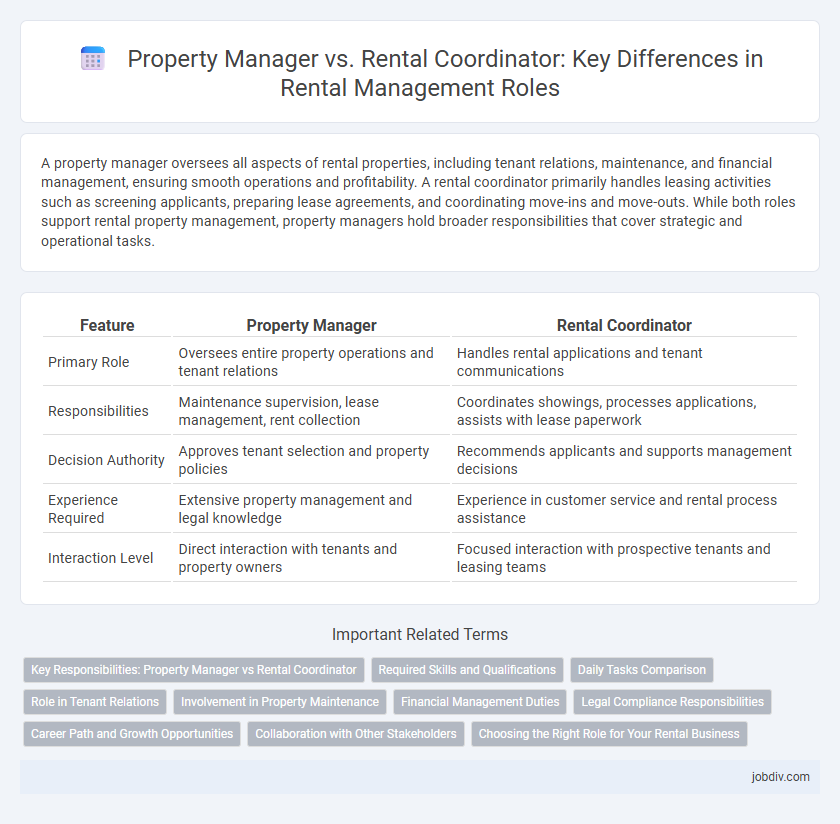A property manager oversees all aspects of rental properties, including tenant relations, maintenance, and financial management, ensuring smooth operations and profitability. A rental coordinator primarily handles leasing activities such as screening applicants, preparing lease agreements, and coordinating move-ins and move-outs. While both roles support rental property management, property managers hold broader responsibilities that cover strategic and operational tasks.
Table of Comparison
| Feature | Property Manager | Rental Coordinator |
|---|---|---|
| Primary Role | Oversees entire property operations and tenant relations | Handles rental applications and tenant communications |
| Responsibilities | Maintenance supervision, lease management, rent collection | Coordinates showings, processes applications, assists with lease paperwork |
| Decision Authority | Approves tenant selection and property policies | Recommends applicants and supports management decisions |
| Experience Required | Extensive property management and legal knowledge | Experience in customer service and rental process assistance |
| Interaction Level | Direct interaction with tenants and property owners | Focused interaction with prospective tenants and leasing teams |
Key Responsibilities: Property Manager vs Rental Coordinator
Property Managers oversee overall property operations, including tenant relations, lease management, and maintenance coordination to ensure property profitability and compliance. Rental Coordinators handle leasing processes, such as tenant screening, rental applications, and lease documentation, focusing on facilitating smooth tenant move-ins and occupancy rates. Clear division of responsibilities enhances property management efficiency by aligning strategic oversight with detailed rental administration.
Required Skills and Qualifications
Property Managers require strong leadership, financial acumen, and expertise in tenant relations to oversee leasing, rent collection, and property maintenance effectively. Rental Coordinators need excellent organizational skills, attention to detail, and proficiency in communication software to manage rental applications, schedule showings, and coordinate tenant inquiries efficiently. Both roles demand knowledge of local rental laws, but property managers typically hold certifications like CPM or ARM, while rental coordinators may have experience with property management software and customer service.
Daily Tasks Comparison
Property managers oversee tenant relations, lease agreements, and maintenance scheduling, ensuring compliance with local regulations and managing financial aspects like rent collection and budgeting. Rental coordinators focus on administrative duties such as processing applications, conducting background checks, coordinating property showings, and maintaining rental databases. Both roles require strong communication skills, but property managers handle broader operational responsibilities while rental coordinators manage detailed tenant onboarding and record-keeping tasks.
Role in Tenant Relations
A Property Manager handles tenant relations by addressing maintenance requests, lease agreements, and conflict resolution, fostering long-term tenant satisfaction and retention. Rental Coordinators primarily assist with the tenant onboarding process, including application screening, lease documentation, and move-in coordination to ensure a smooth transition. Both roles are essential in maintaining positive tenant experiences but differ in their scope of responsibilities and interaction frequency with tenants.
Involvement in Property Maintenance
Property managers oversee property maintenance by coordinating repairs, managing vendor relationships, and ensuring compliance with local regulations, directly impacting tenant satisfaction and asset value. Rental coordinators assist in scheduling maintenance requests and communicating between tenants and maintenance teams, focusing on operational support rather than strategic decisions. Clear role differentiation between property managers and rental coordinators ensures efficient maintenance workflows and property upkeep.
Financial Management Duties
Property Managers oversee rent collection, budgeting, and financial reporting to ensure profitability and maintain accurate records. Rental Coordinators handle day-to-day financial transactions such as processing rental payments, managing security deposits, and coordinating billing inquiries. Effective financial management by both roles supports smooth rental operations and maximizes revenue stability.
Legal Compliance Responsibilities
Property managers are responsible for ensuring full legal compliance with landlord-tenant laws, including lease agreements, eviction procedures, and property safety regulations. Rental coordinators primarily assist with documentation and communication but do not typically handle complex legal compliance issues or enforcement actions. Understanding these distinctions helps property owners assign appropriate responsibilities to maintain regulatory adherence.
Career Path and Growth Opportunities
Property managers typically have broader responsibilities, including overseeing multiple rental properties, tenant relations, and financial management, which positions them for higher-level roles such as regional manager or real estate asset manager. Rental coordinators focus on the operational side, handling applications, lease agreements, and daily tenant communications, offering a strong foundation for advancement into property management or leasing specialist positions. Career growth for property managers often involves increased portfolio size and leadership roles, while rental coordinators can leverage their experience to transition into property management or specialized fields within real estate administration.
Collaboration with Other Stakeholders
Property managers collaborate closely with landlords, tenants, and maintenance teams to ensure smooth property operations and tenant satisfaction. Rental coordinators facilitate communication between prospective renters, leasing agents, and financial institutions to streamline the application and approval process. Efficient interaction among these stakeholders enhances overall rental management, reduces vacancy rates, and improves service quality.
Choosing the Right Role for Your Rental Business
A property manager oversees all aspects of rental properties, including tenant relations, maintenance, and financial reporting, making them ideal for full-service rental businesses. Rental coordinators focus on administrative tasks such as lease documentation, rent collection, and scheduling property showings, suitable for smaller operations needing support in tenant communication. Selecting the right role depends on the rental business size, complexity, and the level of management required to maintain efficient property operations.
Property Manager vs Rental Coordinator Infographic

 jobdiv.com
jobdiv.com